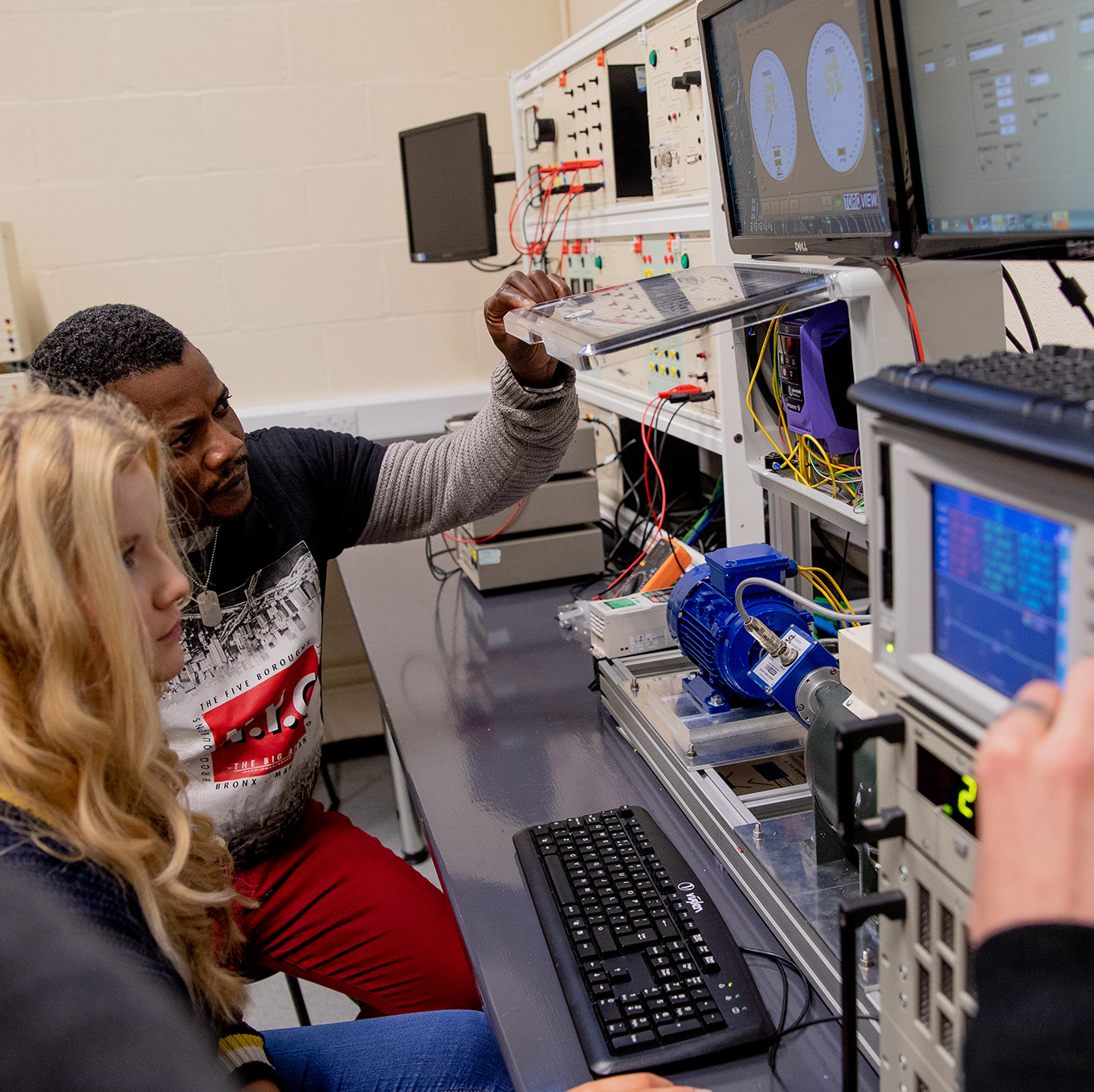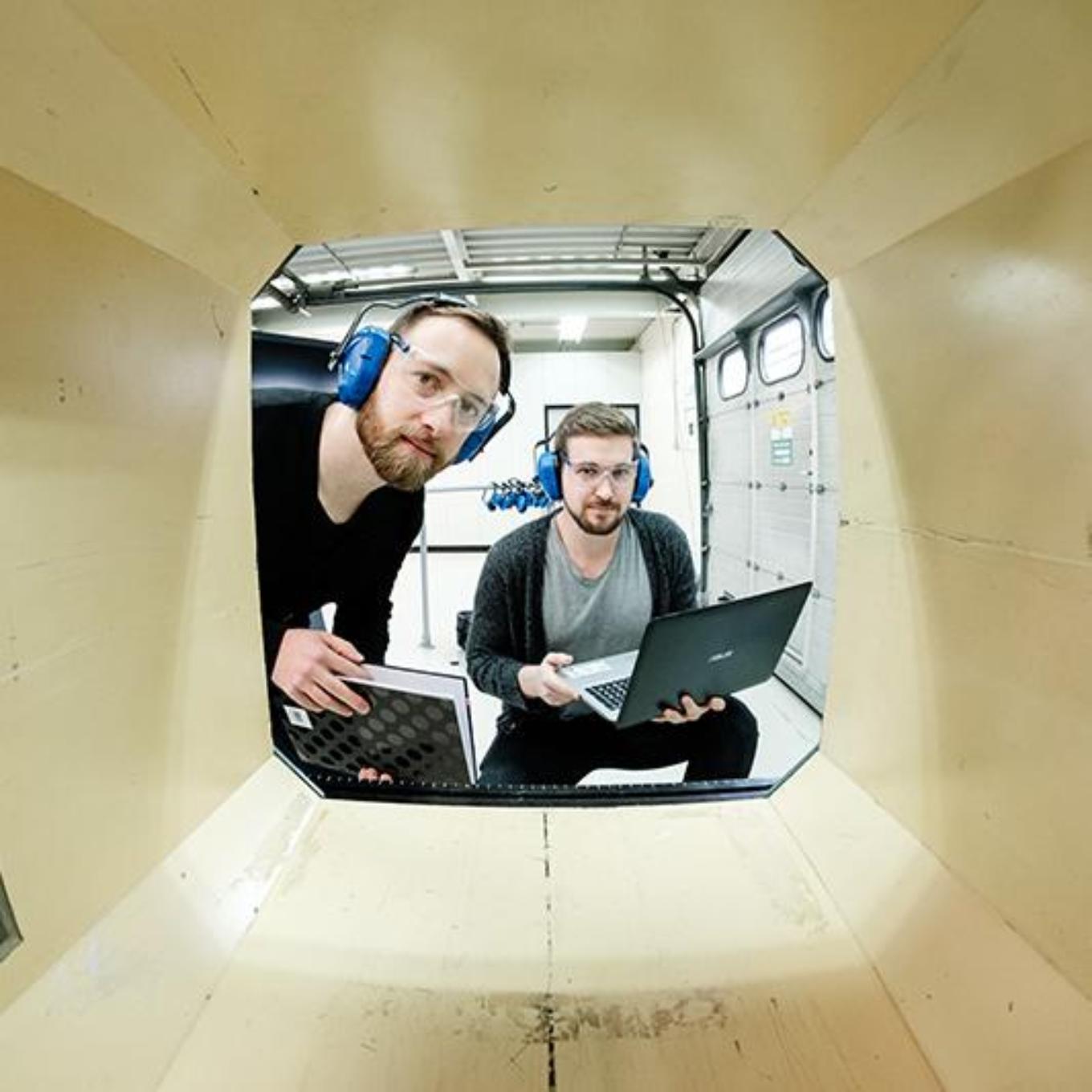BEng (Hons) Renewable & Sustainable Engineering (with Foundation Year)
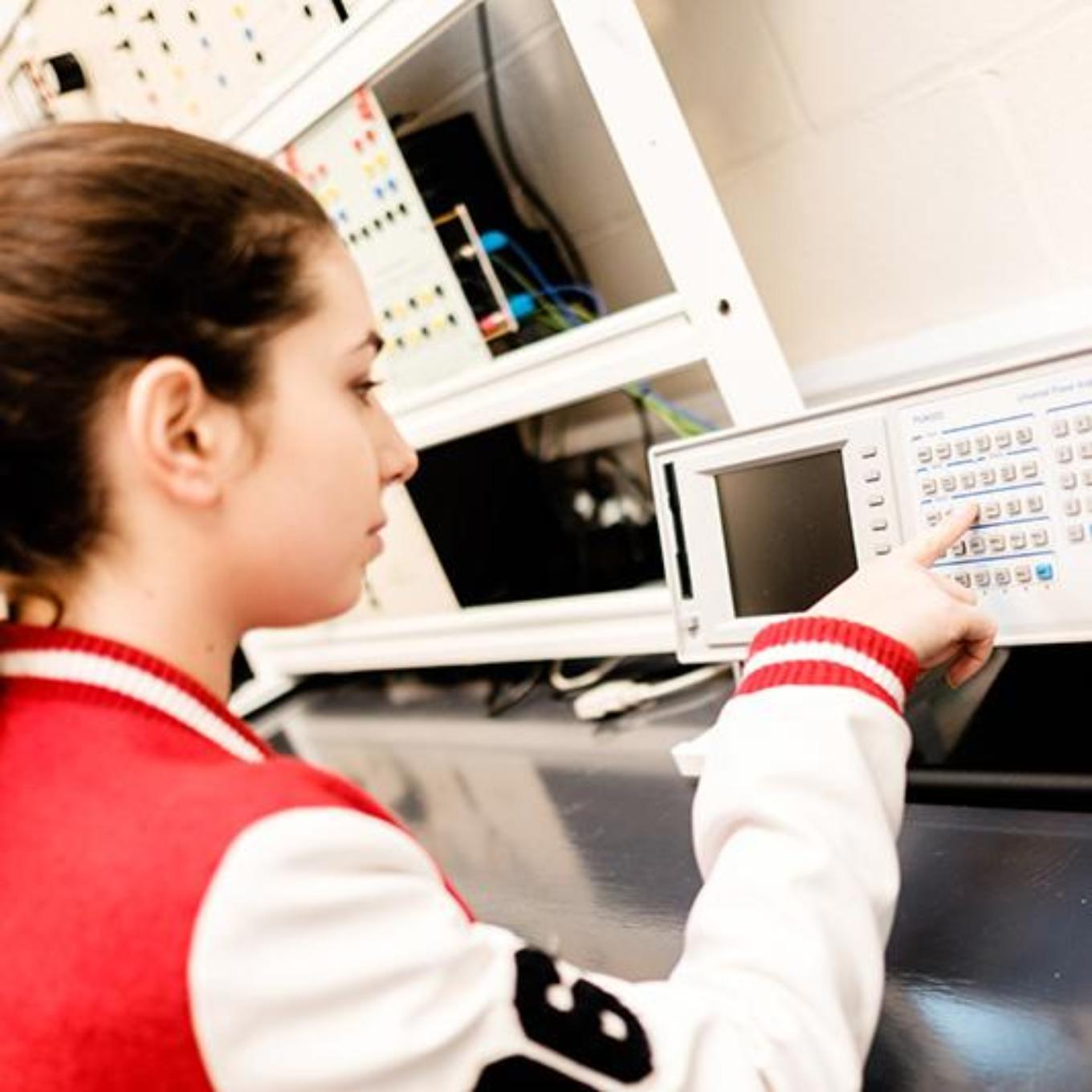
Course details
UCAS Code
HH3P
Year of entry
2025, 2026
Duration
4 YRS (FT)
UCAS Tariff
48-72
Institution Code
G53
Location
Wrexham
Course Highlights
Top 10
in the UK for Student Voice*
Accredited
By Energy institute, IMechE and IEEE
Visits
to local industrial companies including solar, hydro and wind energy sites
Why choose this course?
This degree tackles some of the biggest challenges facing mankind today - affordable energy, climate change, global warming and pollution control. For students wanting to be at the forefront of new engineering and cost effective solutions that will help satisfy the need for renewable energy, this degree could be your next step.
This degree is at the forefront of this new engineering and touches on the finance and politics of the coming model shift into clean energy and sustainability.
On this degree you will:
- Learn how we can help to fix climate change
- Explore renewable energy and learn about sustainability.
- Study a degree that is Energy institute, IMechE and IEEE accredited.
- Gain the tools to make an impact and protect the planet.
- Explore both electrical and mechanical engineering, as well as all types of renewable energy.
- Study a course that boasts high relevant employment success after graduation.
- Start your journey on a path growing in future opportunities.
*This course is part of a subject area ranked top 10 in the UK for Student Voice, Assessment and Feedback and Learning Resources in the National Student Survey, 2024.
This course is also part of a subject area ranked Joint 3rd out of Wales, Scotland, and Northern Ireland for Overall Satisfaction in the National Student Survey, 2024.
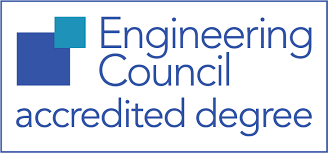
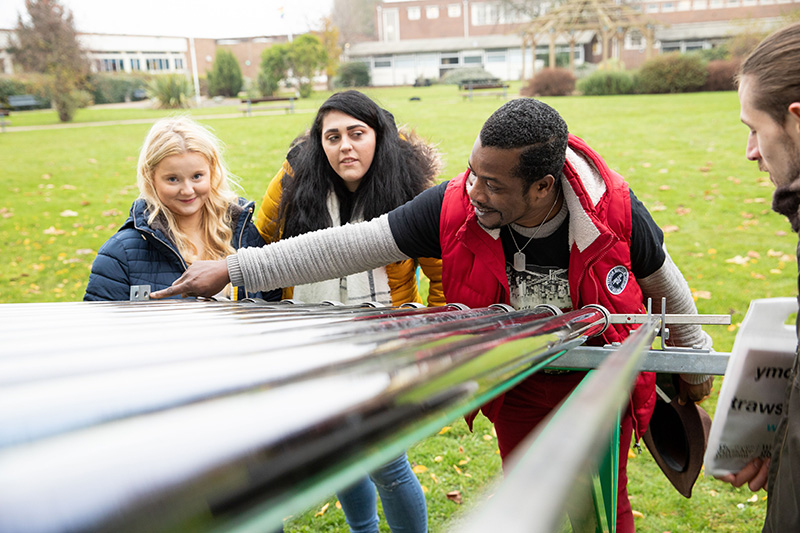
Engineering atWrexham University
Thinking of a career in Engineering? Hear from lecturers and students about our Engineering degrees at Wrexham University.
Key course features
- Includes a foundation year to prepare you for further years of study.
- Industry-experienced lectures active in sustainability research.
- Taught by lecturers with 10 years of experience teaching this degree.
- Includes field visits to interesting renewable energy projects (Wind, Solar, Hydro, Biomass plants).
- Excellent facilities that include well-equipped computer-aided design laboratories, modern electronics laboratories, specialist manufacturing systems, simulation software, industry-standard instrumentation laboratories, industry specification.
- Rapid Prototyping facility (fused deposition method).
- Subsonic wind tunnel laboratory and well-equipped thermo-fluid dynamics lab including a fully operational Pelton wheel and Francis turbine.
- Small class sizes allow for strong tutorial and laboratory experiment support and advice.
- Dedicated maths support for students.
- You will have access to industry standard software packages such as Altium Designer, Multisim, HP VEE, MATLAB & Simulink, Abaqus, AutoCAD, Fluent, Pro Engineer, SolidWorks.
What you will study
Our course has a broad base in order to allow you to develop skills and the ability to contribute to the design of renewable energy systems and progress to meet future requirements both within the UK and worldwide markets.
YEAR 1 (FOUNDATION YEAR)
This year of study ensures that students from all subject backgrounds and life experiences get a foundational course of study that both prepares for subject specific and wider, university skills at an undergraduate level. You will spend time with a subject specific teaching team and a wider support network to ensure you get the support for a wide range of skills.
MODULES
- Study Skills for Success (Core): Develop the essential academic, digital, and organisational skills you will need to thrive at university. From managing your time and structuring assignments to researching and referencing, you will build the confidence to study independently and successfully.
- Collaborative Practice (Core): Work with students from other subject areas to explore cross-disciplinary challenges. You will develop key skills in teamwork, communication, and research while tackling relevant themes across different fields.
- A Day in the Life (Core): Explore the range of career paths linked to your chosen degree. You will gain insight into professional roles in your field and start creating a portfolio to support your development as a future graduate.
- Engineering Principles (Optional): Build your understanding of core topics in physics, mechanics, and electrical circuits. The module also introduces sustainable energy technologies and their role in modern engineering.
- Engineering Practice (Optional): Take a practical approach to engineering by working on a design and prototyping project. You will also explore the ethical, social, and environmental responsibilities of engineers in today’s world.
YEAR 2 (LEVEL 4)
In year 2, you will develop an understanding of the fundamental concepts, principles and theories in engineering. You will acquire basic mathematic skills related to engineering and design problems, and use CAD for engineering design. You will also gain competence of working safely in engineering laboratories and workshops, and be able to conduct laboratory procedures, measurement and workshop practices under the guidance of a tutor.
MODULES
- CAD and Production Science: Learn how to create and interpret technical drawings using industry standard CAD software, and explore how materials, manufacturing processes, and quality control shape the design and production of real-world engineering components.
- Introduction to Electrical and Mechanical Engineering Science: Explore the fundamentals of electrical and mechanical engineering by learning how to analyse circuits and calculate forces, stresses, and strains, while gaining hands-on experience with real world measurement techniques.
- Engineering Mathematics: Gain the essential maths skills you’ll need to solve real-world engineering problems, from working with algebra and calculus to applying key formulas used in electrical, and mechanical.
- Engineering Professional Development: Develop the essential skills and confidence to thrive in the engineering world by learning how to communicate professionally, manage projects, and reflect on your growth as an engineer.
- Future Energy Systems and Sustainability: Learn how to design and evaluate sustainable energy solutions by exploring renewable technologies, energy efficiency, and environmental impacts to help shape a low carbon future.
- Materials and the Environment: Discover how to select and process engineering materials by exploring their mechanical and electrical properties, manufacturing methods, and environmental impact, equipping you to make informed, sustainable design choices.
YEAR 3 (LEVEL 5)
Level 5 will build on the knowledge, concepts and skills acquired at Level 4 in addition to more specialist knowledge, skills in engineering design and analysis. More in-depth in theories in electrical power engineering, renewable energies, structures and finite element analysis, etc will be explored. You will also develop an understanding of business and research methods.
MODULES
- Engineering Futures - Research, Ethics, and Sustainability: Develop your research skills while exploring how ethics, sustainability, and professional standards shape the future of engineering and your role within it.
- Further Engineering Mathematics: Build your confidence in tackling complex engineering problems by mastering advanced mathematical tools like partial differentiation, Fourier series, and Laplace transforms, while learning to analyse data and model systems using industry standard software
- Electrical Power Engineering: Understand how electricity is generated, transmitted, and distributed, and gain hands on experience with the tools and techniques used to design, analyse, and maintain real-world power systems.
- Wind and Hydro Engineering: Learn how wind turbines and hydroelectric systems generate clean energy, and develop the skills to evaluate, design, and improve renewable technologies for a more sustainable future.
- Mechanics, Structures & FEA: Master the principles of structural mechanics and learn how to apply Finite Element Analysis (FEA) to evaluate and optimise real world engineering designs using industry standard simulation tools
- Solar and Biomass Energy Engineering: Explore how to design and evaluate solar and biomass energy systems, integrate them with storage solutions, and assess their environmental impact using real-world data and engineering tools.
YEAR 4 (LEVEL 6)
At Level 6, you will acquire a critical understanding and application of the higher level concepts, principles and theories in engineering, as well as a critical understanding and explanation of advanced topics in composite materials, design, modelling/simulation, and advanced renewable technologies. You will use the knowledge and skills you have acquired to do an individual project.
MODULES
- Mechanical Engineering Modelling and Simulation: Learn how to simulate and analyse real world mechanical systems using industry standard tools like ANSYS, equipping you with the skills to model, test, and optimise designs through advanced computer-based techniques.
- Smart Grids, Storage and Energy Mix: Explore how smart grids, energy storage, and renewable technologies work together to create efficient, flexible, and sustainable power systems for the future.
- Energy Saving, Low Carbon and Recycling Systems: Learn how to design and implement energy-saving, low carbon, and recycling systems by exploring sustainable technologies and strategies that reduce environmental impact and promote resource efficiency.
- Professional Engineering: Develop the professional mindset and practical skills needed to thrive in engineering by tackling real-world scenarios involving ethics, teamwork, health and safety, and legal responsibilities.
- Project: Take on your own engineering challenge by researching, designing, and delivering a project from start to finish developing real world problem solving, project management, and communication skills that prepare you for your future career.
The information listed in this section is an overview of the academic content of the programme that will take the form of either core or option modules. Modules are designated as core or option in accordance with professional body requirements and internal academic framework review, so may be subject to change.
Entry requirements & applying
The academic requirements for the course are 48-72 UCAS tariff points at GCE A-level or equivalent. In addition, passes at GCSE in Maths and English/Welsh (First Language) at grade C/4 or above are normally expected.
Teaching & Assessment
A broad range of assessment methods are used; these include task-based exercises, oral and poster presentations, essays and laboratory reports, and written exams. Each module is assessed by a variety of methods, enabling students to display their full potential. A project dissertation will form one of the final parts of your assessment.
Teaching and Learning
Wrexham University is committed to supporting our students to maximise their academic potential.
We offer workshops and support sessions in areas such as academic writing, effective note-making and preparing for assignments. Students can book appointments with academic skills tutors dedicated to helping deal with the practicalities of university work. Our student support section has more information on the help available.
In terms of particular needs, the University’s Inclusion Services can provide appropriate guidance and support should any students require reasonable adjustments to be made because of a recognised prevailing disability, medical condition, or specific learning difference.
Teaching methods include lectures, laboratory sessions, student-led seminars, field trips and guided research.
Independent learning is an important aspect of all modules, as it enables students to develop both their subject specific and key skills. Independent learning is promoted through guided study or feedbacks given to students.
Career prospects
The career prospects of low carbon and renewable energy students are one of the brightest in this expanding, under skilled area. Upon completion, you can go on to do an MSc in renewable engineering and related PhD.
Previous students are working in sustainability related jobs in government and industry (Renewables and low carbon business). There is also considerable scope for entrepreneurial students to start their own business in this expanding sector.
Our Careers & Employability service is there to help you make decisions and plan the next steps towards a bright future. From finding work or further study to working out your interests, skills and aspirations, they can provide you with the expert information, advice and guidance you need.
The course equips you with a thorough knowledge and skills in engineering at the forefront of new and emerging technologies. Graduates will be well placed to become subject specialists within the industry or to pursue research careers within academia.
This programme prepares students for a career in Renewable Energy and Sustainability related work. Please see indeed.co.uk/Renewable-Energy-jobs to get an idea of the current opportunities available.
Fees & funding
You do not have to pay your tuition fees upfront.
The fees you pay and the support available will depend on a number of different factors. Full information can be found on our fees & finance pages. You will also find information about what your fees include in the fee FAQs.
All fees are subject to any changes in government policy, view our undergraduate fees.
For international students looking to study this course please see our international fees.
Programme specification
You can see the full programme specification here.Accommodation
At Wrexham University, we offer on-campus en-suite rooms within our Wrexham Student Village. These private, fully furnished spaces are conveniently located, providing easy access to campus facilities, study areas, and social spaces. Plus, you’re just a 10-minute walk from the city centre!
With all bills included, free Wi-Fi, 24/7 security, and large social areas, you’ll find everything you need for a great student experience.
Explore our student accommodation options to find your perfect home away from home.
Subject to re-accreditation
External accreditation/recognition by Professional, Statutory and Regulatory Bodies (PSRBs) has to be renewed periodically for existing courses. The details on the website are based on the accreditation of the previous or current version of the course, and the anticipated updates are made as soon as they are known. The majority of courses that are still ‘subject to re-accreditation’ are approved as expected however, this is not guaranteed and should the accreditation not be approved as planned, or be significantly amended or delayed, you will be informed by the University.
International
This course is open to international students, for information about the university’s entry requirements for EU/international students, please visit our international section.
Upcoming Open Days.
Join us at an upcoming open day to meet your lecturers, find out more about our courses, discover our facilities and get a taste of student life.
Browse all of our open days & events.
